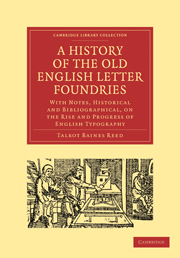 A History of the Old English Letter Foundries
A History of the Old English Letter Foundries Book contents
- Frontmatter
- PREFACE
- Contents
- LIST OF ILLUSTRATIONS
- Introductory Chapter: THE TYPES AND TYPE FOUNDING OF THE FIRST PRINTERS
- Chap. 1 THE ENGLISH TYPE BODIES AND FACES
- Chap. 2 THE LEARNED, FOREIGN AND PECULIAR CHARACTERS
- Chap. 3 THE PRINTER LETTER-FOUNDERS, FROM CAXTON TO DAY
- Chap. 4 LETTER FOUNDING AS AN ENGLISH MECHANICAL TRADE
- Chap. 5 THE STATE CONTROL OF ENGLISH LETTER FOUNDING
- Chap. 6 THE OXFORD UNIVERSITY FOUNDRY
- Chap. 7 THE STAR CHAMBER FOUNDERS, AND THE LONDON POLYGLOT
- Chap. 8 JOSEPH MOXON
- Chap. 9 THE LATER FOUNDERS OF THE 17TH CENTURY
- Chap. 10 THOMAS AND JOHN JAMES
- Chap. 11 WILLIAM CASLON
- Chap. 12 ALEXANDER WILSON
- Chap. 13 JOHN BASKERVILLE
- Chap. 14 THOMAS COTTRELL
- Chap. 15 JOSEPH AND EDMUND FRY
- Chap. 16 JOSEPH JACKSON
- Chap. 17 WILLIAM MARTIN
- Chap. 18 VINCENT FIGGINS
- Chap. 19 THE MINOR FOUNDERS OF THE 18TH CENTURY
- Chap. 20 WILLIAM MILLER
- Chap. 21 THE MINOR FOUNDERS FROM 1800 TO 1830
- CHRONOLOGICAL TABLE OF ENGLISH LETTER-FOUNDERS' SPECIMENS NOTED IN THIS WORK 1665–1830
- LIST OF THE PRINCIPAL AUTHORITIES CONSULTED OR REFERRED TO
- INDEX
- Plate section
Chap. 21 - THE MINOR FOUNDERS FROM 1800 TO 1830
Published online by Cambridge University Press: 05 August 2011
- Frontmatter
- PREFACE
- Contents
- LIST OF ILLUSTRATIONS
- Introductory Chapter: THE TYPES AND TYPE FOUNDING OF THE FIRST PRINTERS
- Chap. 1 THE ENGLISH TYPE BODIES AND FACES
- Chap. 2 THE LEARNED, FOREIGN AND PECULIAR CHARACTERS
- Chap. 3 THE PRINTER LETTER-FOUNDERS, FROM CAXTON TO DAY
- Chap. 4 LETTER FOUNDING AS AN ENGLISH MECHANICAL TRADE
- Chap. 5 THE STATE CONTROL OF ENGLISH LETTER FOUNDING
- Chap. 6 THE OXFORD UNIVERSITY FOUNDRY
- Chap. 7 THE STAR CHAMBER FOUNDERS, AND THE LONDON POLYGLOT
- Chap. 8 JOSEPH MOXON
- Chap. 9 THE LATER FOUNDERS OF THE 17TH CENTURY
- Chap. 10 THOMAS AND JOHN JAMES
- Chap. 11 WILLIAM CASLON
- Chap. 12 ALEXANDER WILSON
- Chap. 13 JOHN BASKERVILLE
- Chap. 14 THOMAS COTTRELL
- Chap. 15 JOSEPH AND EDMUND FRY
- Chap. 16 JOSEPH JACKSON
- Chap. 17 WILLIAM MARTIN
- Chap. 18 VINCENT FIGGINS
- Chap. 19 THE MINOR FOUNDERS OF THE 18TH CENTURY
- Chap. 20 WILLIAM MILLER
- Chap. 21 THE MINOR FOUNDERS FROM 1800 TO 1830
- CHRONOLOGICAL TABLE OF ENGLISH LETTER-FOUNDERS' SPECIMENS NOTED IN THIS WORK 1665–1830
- LIST OF THE PRINCIPAL AUTHORITIES CONSULTED OR REFERRED TO
- INDEX
- Plate section
Summary
This foundry was begun in Sheffield about the beginning of the present century. In 1810, Mr. Bower issued a price list below those of the London founders, whose founts he succeeded occasionally in underselling. Hansard mentions the foundry in 1824, under the style of Bower, Bacon and Bower. No specimen is known with an earlier date than 1837, when the firm was G. W. Bower, late Bower and Bacon.
A later specimen bears the name of Mr. G. W. Bower alone, and in 1841 the firm was Bower Brothers, who published Proposals for establishing a graduated scale of sizes for the bodies of Printing Types, and fixing their height-to-paper, based upon Pica as the common standard.
After the death of Mr. G. W. Bower, the foundry was continued by Mr. Henry Bower till his death about 1851, in September of which year the plant and stock were sold by auction and dispersed among the other founders. The Catalogue of this Sale contained about 50,000 punches and matrices; many of them, however, being obsolete or of small value.
BROWN, 1810.—LYNCH, 1810
These two individuals are included among the Letter Founders whose names are given in Mason's Printer's Assistant—the former having had his place of business in Green Street, Blackfriars, and the latter in Featherstone Buildings. They do not appear to have continued long in business, and their names are not included in the list of Letter Founders given in Johnson's Typographia in 1824.
- Type
- Chapter
- Information
- A History of the Old English Letter FoundriesWith Notes, Historical and Bibliographical, on the Rise and Progress of English Typography, pp. 357 - 364Publisher: Cambridge University PressPrint publication year: 2010First published in: 1887


